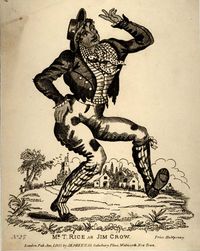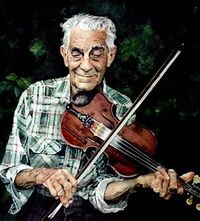Annotation:Jump Jim Crow: Difference between revisions
No edit summary |
No edit summary |
||
| Line 1: | Line 1: | ||
'''Back to [[{{BASEPAGENAME}}]]''' | =='''Back to [[{{BASEPAGENAME}}]]'''== | ||
---- | ---- | ||
<p><font face="garamond, serif" size="4"> | <p><font face="garamond, serif" size="4"> | ||
| Line 55: | Line 55: | ||
<br> | <br> | ||
---- | ---- | ||
'''Back to [[{{BASEPAGENAME}}]]''' | =='''Back to [[{{BASEPAGENAME}}]]'''== | ||
Revision as of 00:38, 8 May 2013
Back to Jump Jim Crow
JUMP JIM CROW. Old-Time, Breakdown. USA, West Virginia. D Major. Standard tuning (fiddle). AB (Silberberg): AABB (Phillips). The origins of the Jim Crow song, character and dance come from a black entertainer named John 'Picayune' Butler, who was perhaps originally from Martinique, but who made his home in New Orleans. He is said to have started his career sometime in the 1820’s, and by 1850 his fame was such that he was known throughout the Mississippi and Ohio River regions, even to Cincinnati. According to T. Allston Brown (Early History of Negro Minstrelsy, 1913) it was around 1830 that an entertainer named George Nichols first sang a song about ‘Jim Crow’, first as a clown, and then in blackface. "He first conceived the idea,” notes Brown, “from...a banjo player, known [along the river route] from New Orleans to Cincinnati as Picayune Butler". The title of this old minstrel tune appears in a list of traditional Ozark Mountain fiddle tunes compiled by musicologist/folklorist Vance Randolph, published in 1954. The set of lyrics below is from "Sketches and Eccentricities of Col. David Crockett of W. Tennessee," 1833, by J.S. French {quoted by Charles Wolfe, The Devil's Box, Sept. 1982, p. 38}.

My old misses she don't like me,
Because I don't eat the blackeyed pea. ... (x2)
My old misses long time ago, She took me down de hill side to jump Jim Crow.
First upon the heel tap, then upon the toe,
Every Monday morning I jump Jim Crow.
Oh, Lord, ladies don't you know,
You never get to heaven till you jump Jim Crow.
Repeat beginning strain of song).
African-American collector Thomas Talley printed a version in his book Negro Folk Rhymes (reprinted in 1991, edited by Charles Wolfe), which goes:
Git fus upon yo heel,
An' den upon yo toe;
An ebry time you tu'n 'round,
You jump Jim Crow.
Now fall upon yo knees,
Junp up an' bow low;
An' ebry time you tu'n 'round,
You jump Jim Crow.
Put yo han's upon yo hips,
Bow low to yo beau;
An' ebry time you tu'n 'round,
You jump Jim Crow.

In the 1960's Braxton County, W.Va., fiddler Melvin Wine (1909-2003) returned to fiddling after a 20 year hiatus and was 'discovered' by young revival fiddlers, eager to learn authentic tunes. "'One song I played, Jump Jim Crow, the young people just hungered for that one,' Melvin says. 'I played it so many time at (the West Virginia State Folk Festival at) Glenville, I wore the feathers off the crow'" (Mountains of Music, John Lilly ed., 1999, p. 11).
Sources for notated versions: Melvin Wine (West Virginia) [Milliner & Koken, Phillips]; Tony Mates [Silberberg].
Printed sources: Milliner & Koken (Milliner-Koken Collection of American Fiddle Tunes), 2011; p. 352. Phillips (Traditional American Fiddle Tunes), vol. 1, 1994; p. 129. Silberberg (Tunes I Learned at Tractor Tavern), 2002; p. 78.
Recorded sources: CD, Alan Jabbour, James Reed, Bertram Levy - "A Henry Reed Reunion" (2002). Poplar LPI 40290, Melvin Wine - "Cold Frosty Morning" (1976).
